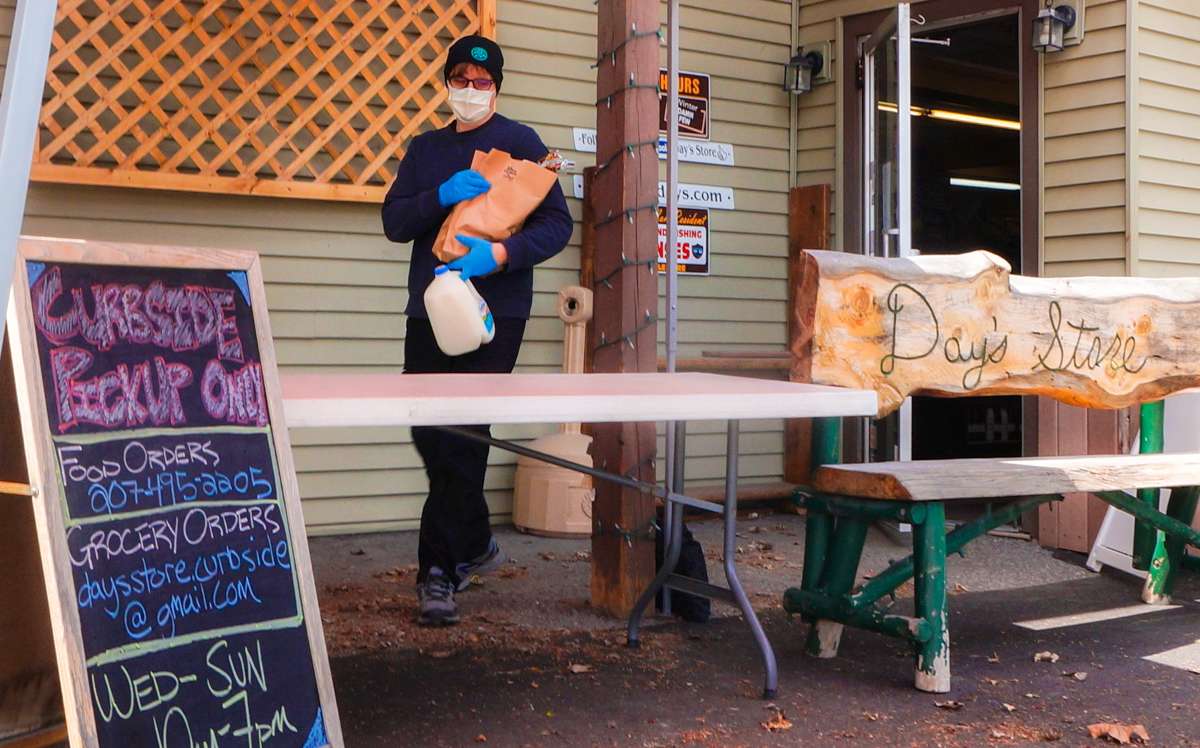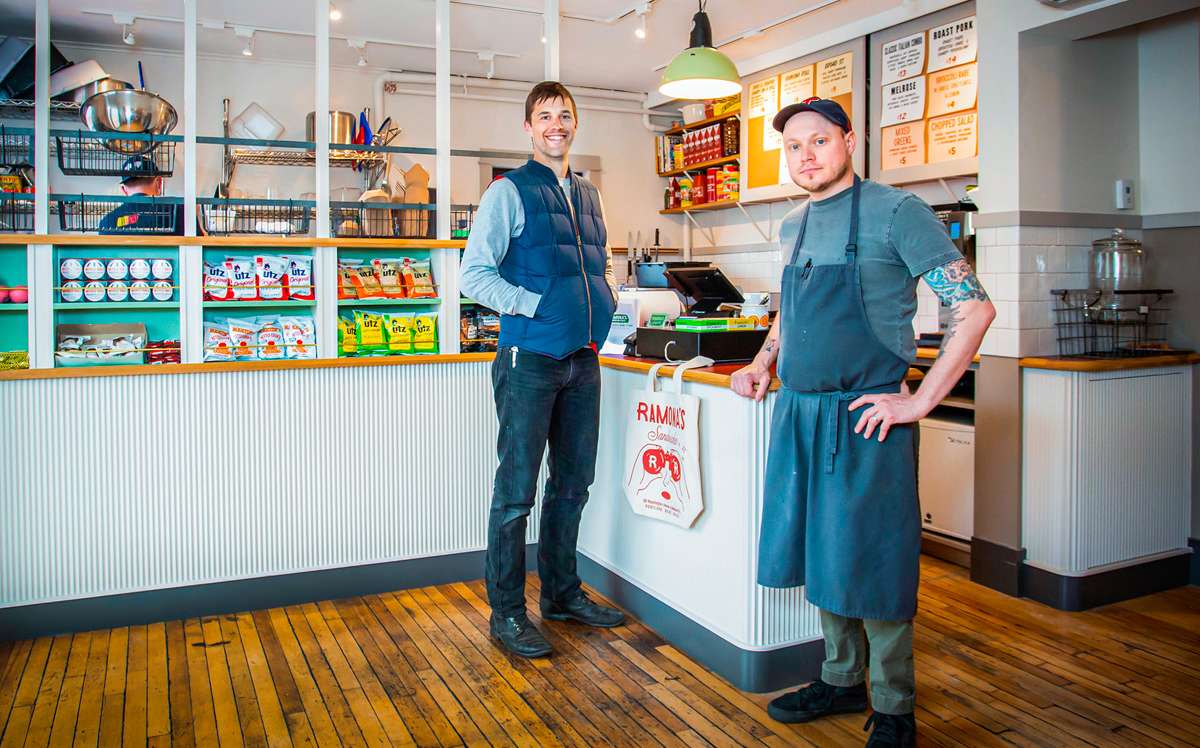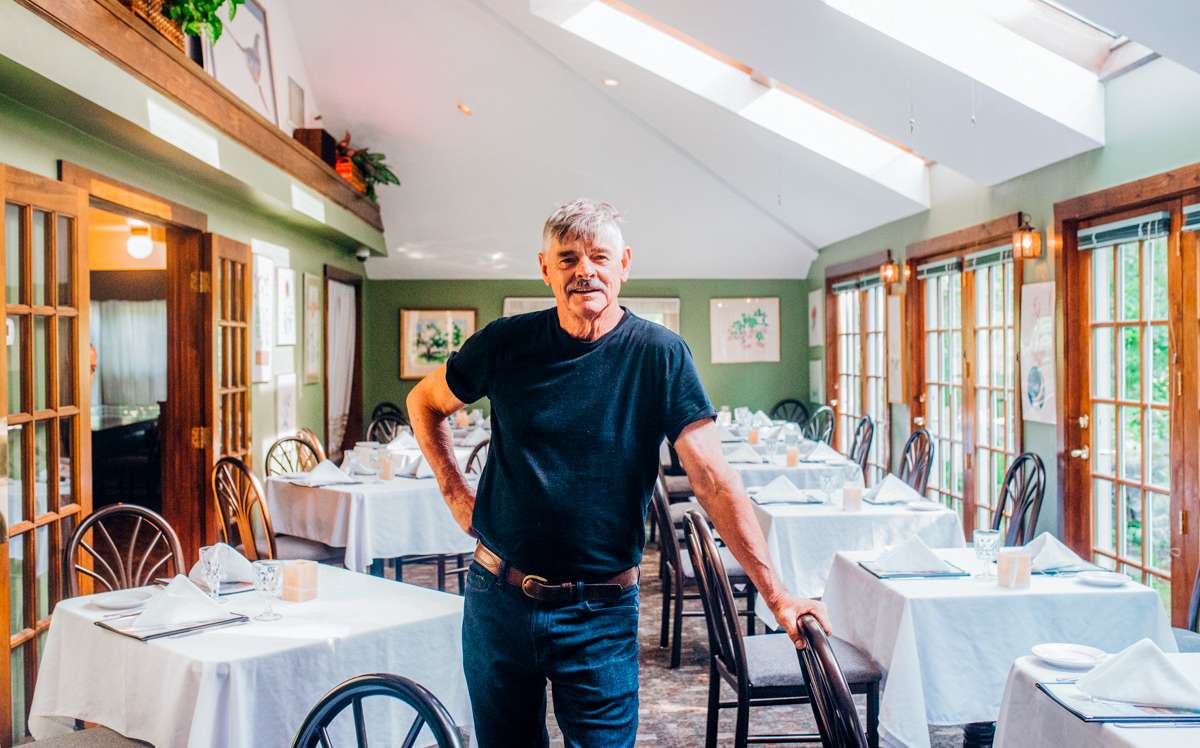
Derailed for now, five small businesses make changes to stay on track
 Photo / Tim Greenway
Joanna Pease, owner of Jibe Cycling Studio, in her new Yarmouth location, whose opening has been delayed.
Photo / Tim Greenway
Joanna Pease, owner of Jibe Cycling Studio, in her new Yarmouth location, whose opening has been delayed.
Jibe Cycling opened in 2018 at 20 Free St. in Portland and things had gone great. So great, that owner Joanna Pease was poised to open a second studio in Yarmouth on March 27.
She announced the ribbon-cutting March 9. Three days later, the state’s first COVID-19 case was reported.
Pease closed Jibe down immediately.
“At the time, we hadn’t been told to close, but it just seemed like the right thing to do,” she says.
She had a bunch of stationary bikes, both in Portland and Yarmouth, and a lot of clients who wanted to exercise. And she isn’t one to sit still.
She launched Jibe at Home within weeks. She rented out all the bikes she had, then got more from gyms, and rented those out, too. She and her instructors created streaming spin videos, available by email to members. By the end of April, there were 250 and counting.
Still, the past two months has been “a roller-coaster of going from high highs to lows.”
Pease laid off all her instructors, most of them contract workers. “It was painful,” she says.
She got a Payroll Protection Program loan and hired back her two full-time staffers.
Jibe can reopen on June 1, adhering to state guidelines. Pease plans to open in Portland, with sanitary protocol that goes beyond what the state requires. In a streak of good luck, she’d bought an electrostatic sprayer for cleaning before everyone wanted one. These days, they’re harder to get than toilet paper.
Jibe at Home will likely stay in some form. It’s drawn members from places that her physical business never would have. “We have quite a group in Bangor,” she says.
She plans to open the Yarmouth studio once Portland is up and running. “It’s a beautiful studio and I can’t wait to fill it with people,” she says.
Overall, she’s optimistic. “You have to be,” she says. “If you go down those negative roads, you don’t know when you’re going to come back up.”
A new beginning delayed
Day’s Store in Belgrade Lakes closed for renovations Dec. 15, with a plan to reopen by Easter.
“This was the first time we’ve done this since my parents used to close in the winters back in the early 70s,” says owner Diane Oliver. Her family has owned the village store for 61 years. It’s not only the go-to place for year-round and summer residents in half a dozen surrounding towns, but also travelers on Route 27 to Sugarloaf, and other points north.

The 200-year-old building underwent an interior overhaul, which was almost complete by early March, when they learned coolers from California were delayed.
“We contemplated not opening until the coolers were set, and then the stay-at-home order was enacted,” Oliver says. She, her husband Kerry and daughter and son-in-law, Melissa and Kirt Furbush, felt the community needed the store. They opened as planned, but with just curbside pickup
“We knew we had to protect ourselves, because if one of us became sick we’d have to shut down,” she says. Deliveries are into an adjacent garage, where they clean everything before shelving. They wear masks and gloves and orders are placed on a table out front under a tent.
“The first day we had a lot to learn, as did our customers,” she says.
They updated their website and Facebook page for the pickup, with pictures of inventory. “We can tell by shopping lists that people are shopping directly from the photos,” she says. Customers order by email, and when it’s ready, the customer is called, pays on the phone, and a pickup time is set.
Oliver says some aspect of the order-ahead model may stay. Before the pandemic, the manager of a set of camps contacted Day’s, asking if groceries could be pre-ordered and delivered to be there when residents arrived. “So, email grocery lists, personal shopping and packaging groceries may continue at some level,” she says.
Over the past couple of years, Day’s added wine-tastings, live music and an indoor eating area. Oliver says they’re also anxious to open up the ice cream window overlooking Long Pond.
The Belgrade Lakes region is a popular tourist area, and Day’s does 75% of its business between June 15 and Aug. 15, when the store is open 14 hours a day, seven days a week and the staff increases from half a dozen to as many as 25.
Now, “we’re open, but it’s not business as usual.” That will wait until they can operate safely, she says. “We’re still very concerned about what the summer will or will not bring for business to the area, and for our fellow business owners.”
In the meantime, “Everyone is very flexible, patient and kind,” she says. “We are very thankful for our community and happy that we can continue to be here for them.”
Making the slow pivot
Ramona’s, at 98 Washington Ave. in Portland, was set to open March 25. It was the latest venture for Chad Conley, owner of Rose’s Market and the Palace Diner, and Josh Sobel.
The small sandwich shop could’ve made the quick pivot to curbside pickup, but as the reality of what the pandemic might bring became clear the weekend of March 14, they decided not to open.

It was a hard decision, but the owners felt a responsibility to their staff, and the community, to not expose them to the virus.
“We were sad we were losing the opportunity to open on our own terms,” he says. “We wanted to introduce Ramona’s on our terms, not the virus’s terms. We were proud of what we’d done, we’d put a lot of care into it.”
As the shutdown took hold, he saw a lot of restaurants struggling with pickup, juggling timing of orders, customers arriving in bunches.
After taking some time to think about it, Ramona’s owners devised a limited pickup plan, where customers order in advance and are given a pickup time, with a limited number of slots.
It’s working well, but it’s not sustainable. “You can’t sell 100 sandwiches a week and pay the rent,” he says.
Just as they were slow to open with a pickup plan, they’ll be slow to reopen. The dining area is too small to distance well, he says. “It might be takeout only, limited hours.”
Despite the challenges, Conley feels fortunate. “Everyone knows the restaurant industry is getting hit really hard,” he says. His three businesses are the type that could pivot to delivery and pickup. He still isn’t sure how they’ll look on the other side of things.
“The farthest I can see, the farthest I dare to plan, is about a month out.”
Strange new world
Elena and Ben Metzger have owned Print Bangor, at 80 Central St. in downtown Bangor, for five years.
“We’re known for our wide-format printing,” she says, the kind used for blueprints and plans. “That’s our bread and butter.” It helps that the shop is next to WBRC Architects.
The pandemic hasn’t slowed that business — Metzger expects that’ll hit later — but there’s been another change.
“We’re getting a lot of new customers,” she says. “We’re expanding into some weird areas.”
Before, with regular customers who had consistent needs, she could predict what was coming. “I knew who was going to need mailers, who needed signage.”
Now the shop is printing labels for carry-out drinks, stickers for floors and temporary signs spelling out safety measures.
Metzger’s following the news, trying to predict what new product they’ll be making next.
The shop has nine employees, and she’s maintained staff thanks to a PPP loan.
Employees who don’t work at home stay in designated work areas and wear masks. All pickup is curbside.
They’ve changed in other ways, too. The shop, which traditionally used old-school word-of-mouth marketing has spruced up its website and Facebook page, expanding its reach. Metzger even found herself networking with a print shop owner in South Dakota recently.
She’s sought support from the regional Small Business Development Center, something she strongly recommends to other businesses.
“My advisor says, ‘Just keep moving.’ You have to keep moving to survive,” she says.
Metzger is proud the shop is open, and helping out.
“There’s definitely a community vibe of wanting to support local businesses,” she says. “We’re all supporting each other.”
Big restaurant reopening small
Jonathan’s in Ogunquit is one of Maine’s larger restaurants, with seating for 240 in the dining room, and another 240 in the concert room. When it reopens June 4, most of those seats won’t be there.
“We’ve taken out 60% of our tables and chairs in the dining room,” says owner Jonathan West.
Comedian Bob Marley will perform June 5 before 50 people, not a packed room, since 80% of the seats in that room are also gone.

The restaurant’s homepage has a detailed list of measures being taken to meet safe opening guidelines.
West has worked hard to do what’s been asked, but he’s not happy about it.
The restaurant closes in January and February, though it hosts functions in those months, and typically reopens in mid-March. Typically, but not this year.
“The government wouldn’t let us,” he says. He doesn’t discount the seriousness of the virus or the pandemic. But he’s frustrated that other kinds of businesses, particularly big box stores, are open and full of customers.
West, the Maine Restaurant Association’s 2017 Restaurateur of the Year, holds his restaurant to high standards.
“We don’t have ketchup bottles on the table,” he says. Table linens are changed after each meal. He sees customers in stores feeling fruit and vegetables, then putting them back. “No one’s touching our broccoli or peaches but us, and I trust my staff to do it safely,” he says.
He’s anxious and ready to open. “I’m following the guidelines they have now, and hope they don’t change. If there are more outbreaks, shut Walmart down, not Main Street.”










0 Comments